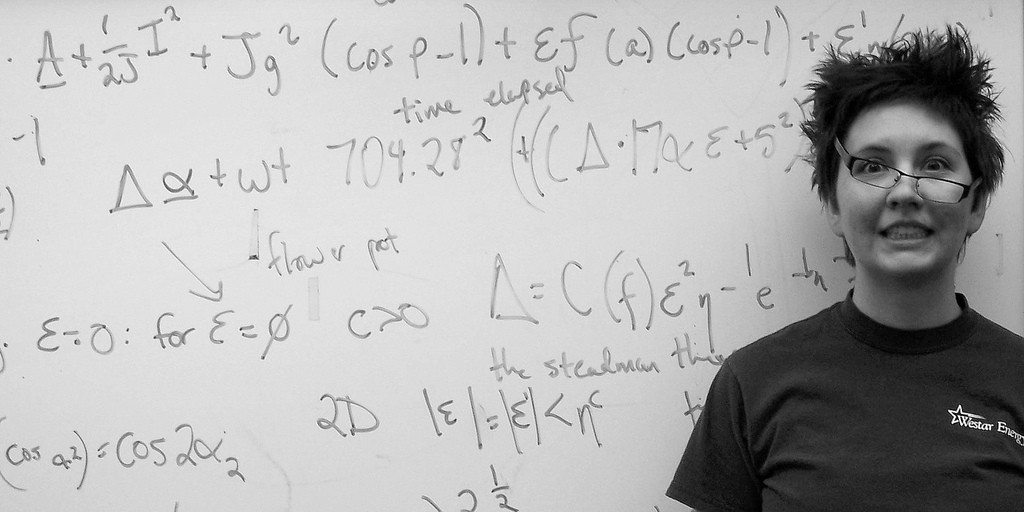
The other day I was sitting on a bench in Boulder, Colorado’s Pearl Street Mall and I overheard a young, hipsterish guy laughing about the fact that he kept messing up those subtraction Captchas — you know, the little puzzles that prove your humanity by asking things like 4 – __ = 2. I’ve blown my fair share of math problems. But what caught my ear wasn’t that he struggled with Captchas, it was the fact that he excused it, saying, “Hey, I’m not a numbers person…” Because he wasn’t a numbers person, it was okay to be bad at math. More than that, it was okay to not try to be good at math.
That terrifies me. What if my kids decide they’re not “numbers people”. Should I start force-feeding them abaci (at $20 apiece!)? It was in this desperate frame of mind that I came across a recent article in the journal Child Development describing the path to what the researchers call the development of “mathematics identity”.
Think about it: what creates the self-concept that one is or isn’t a math person? The obvious answer is that it must depend on whether you believe you’re good at math and are, in fact, good at math.
To test this assumption the researchers from Harvard, Florida International University and Western Kentucky University explored data from 9,000 college calculus students, comparing background, experiences and career goals to performance in their math classes. As you might remember, a basic calc class is prerequisite in many majors, making it a perfect place to look for differences between “math people” and “not math people.” Most importantly, the researchers asked what ingredients mixed together in what combination were the markers of people who had a strong mathematics identity?
This gets a little nuanced, but overall it wasn’t a student’s math competence or even some sort of warranted or unwarranted confidence in their math skills that made students think they were “math people.” Instead, it was others’ recognition of their skills and their own interest in math. Sure, being good at math led to some of this external recognition and internal interest, but what really mattered was how much students liked it and how they perceived others’ opinions of their math ability.
The researchers put it this way: “Performance/competence self-perceptions are not suf?cient to developing a mathematics identity — recognition and interest are paramount.”
They also write that, “This ?nding is important to consider because students’ perceptions then have the potential to in?uence their behavior and choices, such as the choice to take advanced mathematics courses or pursue a mathematics-related career, and thus may become self-ful?lling.”
Accepting the identity of a math person can help to make you a math person. But just being good at math isn’t enough. To become a math person or to help your children become math people and thus avoid buying abaci in bulk, you’ll have to find or foster interest and recognition; math identity is about choosing to engage in math and having this engagement recognized.


As a math educator myself, it galls me when people are okay with being bad at math. I had one student who said “my mom isn’t good at math, so why should I expect to be good at it?” There was an attitude in the household that if the parents are bad at math, then the kids have no hope in being good at it. It has been my goal in the past few years to garner interest in math, by teaching homeschool students in a local co-op. I teach classes like “Math in Games” and “Logic: It’s Elementary Watson” to get students interested in math. One student said she hated math when she took my math in games class, but at the end, said she loved math. The students repeatedly tell me it’s because I made math fun. They never knew so much math was in board games or in nature, etc. Sure, there may be some genetic connection between someone being a genius in math vs just being good at math, and I think those who at least have an interest in math and want to work hard at it, they will do well enough to pass high school classes.
Exactly! And practical, too. My 9yo and I were just hanging an indoor rock climbing wall that was supposed to overhang by 20 degrees. The overhanging face of the wall was framed with 96″ 2x4s. A little trig showed the length of the struts connecting from the top of the climbing wall straight back to the wall where we were mounting it. Then instead of building a whole new chicken run for our five lovely ladies, we decided to string wire around the base of our circular trampoline. How much wire did we need? Thank you 2piR! I think that adopting a ‘math identity’ makes you see numbers in the world around you.
music teachers don’t get all upset when people
claim not to be musicians. “i can’t sing” isn’t a
problem, though: music isn’t a *required class*.
same with drawing and for that matter basketball.
“music people” and “drawing people” and “sports
people” and “cooking people” are all out there and
nobody complains if somebody says they’re not
one of ’em. what’s the big mystery?
Good point, Vlorbik, but I do think that by saying you’re not any “kind of person” you ensure that you never will be.
As the mother of a man getting ready to defend his PhD thesis in math, I have a story I would like to share with you.
I wasn’t too bad in math, it was one of my favorite subjects in school, and I even got to calculus level later. I married a man with a math phobia, and we had two sons.
Neither son was very good in math in the lower grades, and at a certain point, both of them told me more or less that they weren’t math people. “I’m not good at math, mom” When my first son told me that, he got an intervention. As he started algebra, we sat together and did factoring until he “got” it. and then i watched him fly.
At the same age, my PhD son told me he wanted to be in the honors math class. His teacher told me he could only be in that class if he’d learn his math facts. Right, at the end of 8th grade, this boy could not add, subtract, multiply or divide without using his fingers. That summer, we played addition and multiplication bingo after dinner. My husband played cribbage with him (my math phobic husband was a whiz at cribbage). And when he started algebra, I did the same with him as I did my other son. No son of mine was going to not be a math person..
As an aside, I took calculus again as an adult, and it was REALLY hard. Both of my sons helped me with my homework.
What a great story! I love that your sons help with your calc homework. And I think it’s interesting that your PhD son was somehow self-motivated to join honors math despite the fact that he couldn’t “add, subtract, multiply or divide without using his fingers.” This seems the crux of his transformation: Something in him *wanted* to be a math person. And you were able to help make it happen. Kudos!
I could not agree more! It is interesting to talk about math. Math is definitely hard to get along with if you dislike it. But once you step out believing you can love it, you will find yourself understanding numbers and formulas. Learning really should start on how you perceive the process. You have to choose math and all that goes with it. I would love to read more of this…
Cheers, James! I’ve been enjoying poking around in this topic via Google Scholar and plan to keep an eye out for more. For me, I remember my realization in middle school that math could be fun in the same way that a crossword puzzle or Carcassonne or Sudoku or Encyclopedia Brown can be fun. Not that these games/books have anything to do with math, but there’s a fun puzzle in discovering an answer to any problem, math included. It seems like learning to see solving for x as a fun challenge is a major turning point in math education…or at least it was for me.
I think many people would confess they are bad at math than in other subjects. The common notion is math is a hard subject, so it’s pretty okay to suck at it. And also, being bad at math doesn’t really mean you are downright stupid. I know great intelligent people who have a hard time in Algebra and Trigo but are awesome in other subjects.